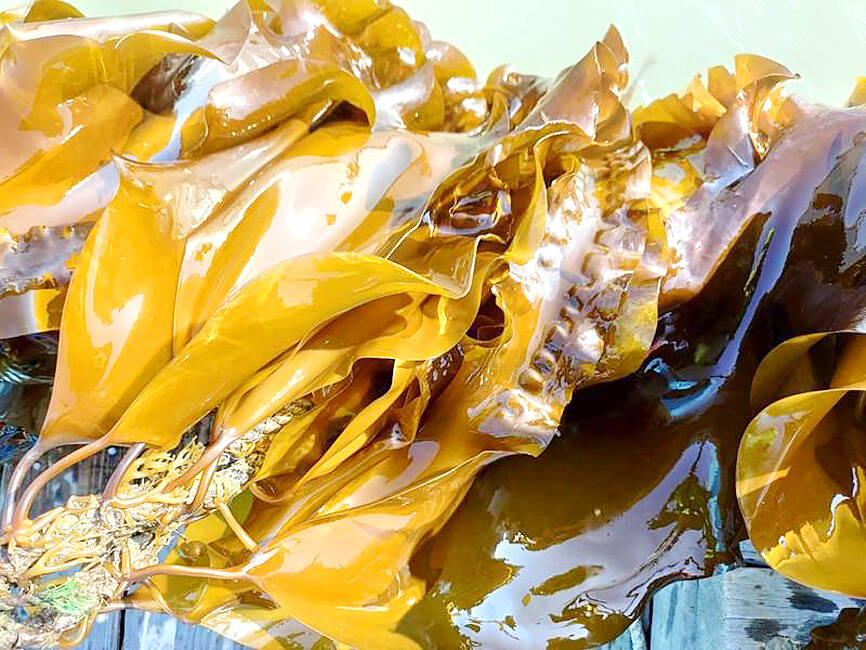Encouraging growth of Bacteroides plebeius can potentially suppress colitis-associated colon cancer development, Academia Sinica researchers said.
Institute of Biological Chemistry, Academia Sinica researcher Meng Tzu-ching (孟子青) said that he and his team conducted the research due to the prevalence of colorectal cancer in Taiwan, which can be caused by multiple factors, including chronic inflammation, genetic disposition, gut dysbiosis and genetics.
Dietary habits and predilection for exercise are other possible causes, Meng said.

Photo courtesy of the Fisheries Research Institute
This bacteria, which are also known as Phocaeicola plebeius, are commonly found in Japanese people, who have a reputation for longevity and healthy digestion, as well as eating seaweed and kelp at least two or three times per week, the researchers said.
The team undertook the project to attempt to show a causal relationship between B plebeius and Japanese gut health, with colonization of the bacteria in mice guts facilitating an evaluation of the long-term effects on colon cancer development, they said in a paper, “Gut colonization of Bacteroides plebeius suppresses colitis-associated colon cancer development,” which was published in the journal Microbiology Spectrum on Jan. 13.
Mice that were given seaweed and kelp showed a greater tendency of high rates of B plebeius growth, the paper said.
Colonies were studied from gnotobiotic and specific-pathogen-free mice that had been given azoxymethane and dextran sulfate sodium (AOM/DSS) — tumor promoting substances, Meng said.
Tissue samples collected after 90 days of AOM/DSS administration showed that tumor number, burden and size in the population of mice fed a seaweed diet and B plebeius were significantly reduced compared with mice fed the seaweed diet alone, the report said.
B plebeius can effectively restructure the gut microbial community and produce beneficial metabolites to inhibit colon cancer development, it said.
The bacteria have potential as a therapeutic agent in cancer prevention, it added.
Preliminary investigations show that more than half of Taiwanese have B plebeius in their guts and that further research would look into how the bacterium inhibit colon cancer.

The manufacture of the remaining 28 M1A2T Abrams tanks Taiwan purchased from the US has recently been completed, and they are expected to be delivered within the next one to two months, a source said yesterday. The Ministry of National Defense is arranging cargo ships to transport the tanks to Taiwan as soon as possible, said the source, who is familiar with the matter. The estimated arrival time ranges from late this month to early next month, the source said. The 28 Abrams tanks make up the third and final batch of a total of 108 tanks, valued at about NT$40.5 billion

Two Taiwanese prosecutors were questioned by Chinese security personnel at their hotel during a trip to China’s Henan Province this month, the Mainland Affairs Council (MAC) said yesterday. The officers had personal information on the prosecutors, including “when they were assigned to their posts, their work locations and job titles,” MAC Deputy Minister and spokesman Liang Wen-chieh (梁文傑) said. On top of asking about their agencies and positions, the officers also questioned the prosecutors about the Cross-Strait Joint Crime-Fighting and Judicial Mutual Assistance Agreement, a pact that serves as the framework for Taiwan-China cooperation on combating crime and providing judicial assistance, Liang

A group from the Taiwanese Designers in Australia association yesterday represented Taiwan at the Midsumma Pride March in Melbourne. The march, held in the St. Kilda suburb, is the city’s largest LGBTQIA+ parade and the flagship event of the annual Midsumma Festival. It attracted more than 45,000 spectators who supported the 400 groups and 10,000 marchers that participated this year, the association said. Taiwanese Designers said they organized a team to march for Taiwan this year, joining politicians, government agencies, professionals and community organizations in showing support for LGBTQIA+ people and diverse communities. As the first country in Asia to legalize same-sex

MOTIVES QUESTIONED The PLA considers Xi’s policies toward Taiwan to be driven by personal considerations rather than military assessment, the Epoch Times reports Chinese President Xi Jinping’s (習近平) latest purge of the Chinese People’s Liberation Army (PLA) leadership might have been prompted by the military’s opposition to plans of invading Taiwan, the Epoch Times said. The Chinese military opposes waging war against Taiwan by a large consensus, putting it at odds with Xi’s vision, the Falun Gong-affiliated daily said in a report on Thursday, citing anonymous sources with insight into the PLA’s inner workings. The opposition is not the opinion of a few generals, but a widely shared view among the PLA cadre, the Epoch Times cited them as saying. “Chinese forces know full well that